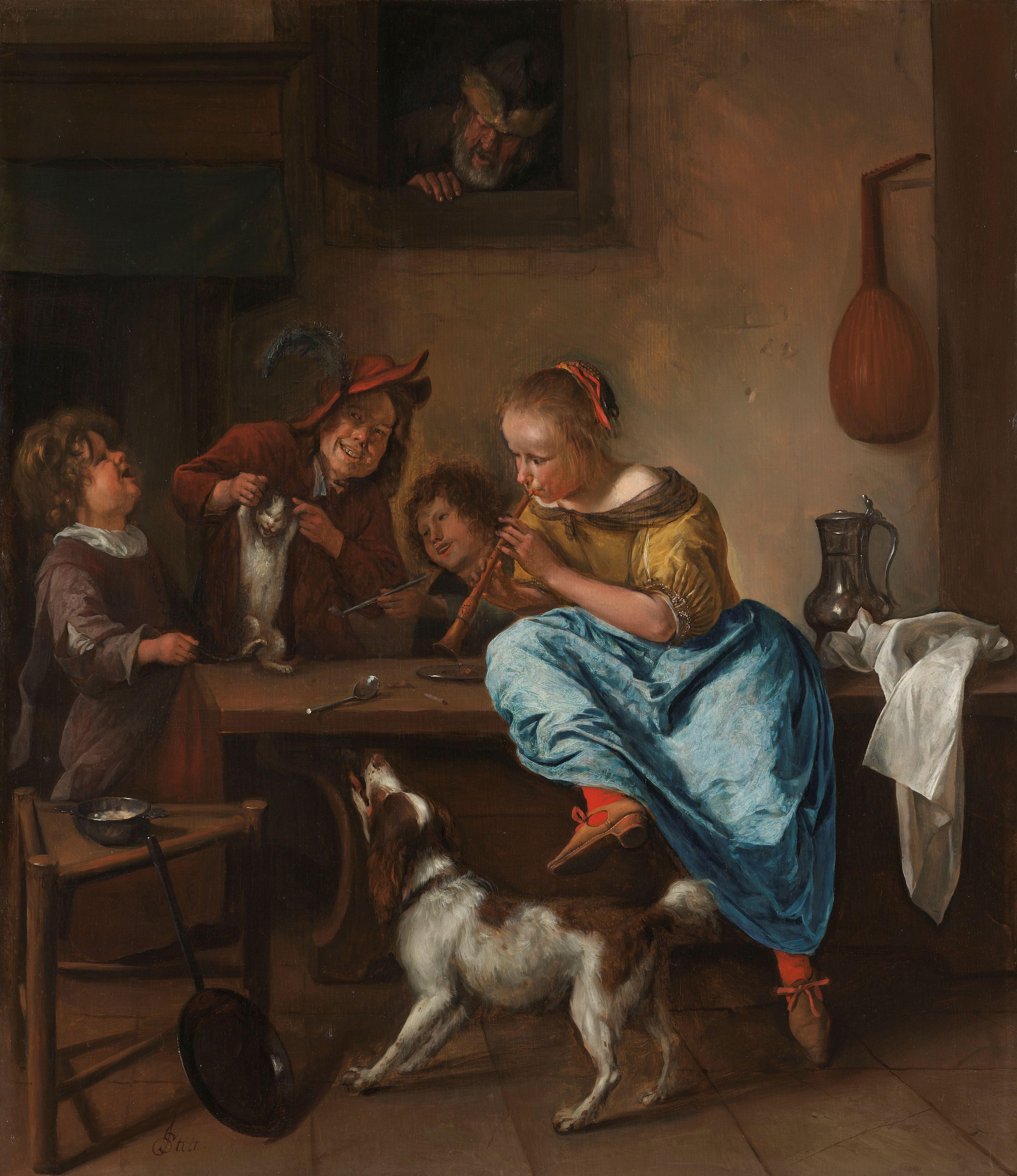PlayForWork

Jan Havicksz. Steen:
Children Teaching a Cat to Dance,
Known as ‘The Dancing Lesson’ (1660 - 1679)
"Maybe mastery makes fun of everything."
Early on, I imprinted on the idea that work really should be play. I sensed that the term work mischaracterized its own possibility, creating a false and disastrous dichotomy. Work might not necessarily be the opposite of play, but the very highest example of it. Mischaracterize that high-order play as work, and people might primarily engage in it to earn time away. Folks might day-dream of retirement rather than reveling in the very embodiment of what they might have been dreaming to achieve. In this way, the carrot became the stick and people started consenting to investing their time in productive but meaningless activities. Some even agreed to become professionals and a few of those consented to become responsible, and before anyone knew it, adulthood had gone to Hell without even the comforting benefit of handbaskets.
When work becomes play, it gets easier to get through the day. One still might have to face up to distasteful parts, but the purpose shifts. For whom one labors becomes clearer, for instance. PlayForWork leaves the worker as the beneficiary of their own effort. They no longer labor for The Man, but for their own hand. They become clear and focused upon what's in it for them. There can be no exploitation when one perceives their work as play. They quite naturally just do it their own way, in acts of self expression. They might follow directions, but not to please anyone else. Even simple board games have rules which increase the tension between the players, and without those arbitrary boundaries, board games quickly become boring. Players can always choose to play with the rules, too, interpreting them differently, depending upon what each player's intending. 'Never the same way once' might well be the motto of the dedicated player worker.
Years ago, I championed a movement I labeled 'Bring Yourself To Work Day.' I found some others who had organized themselves into something visible and begun advertising this perspective as a necessity. They started off focusing upon a single day dedicated to this end, but I thought, "Why not everyday?" The chief difficulty I'd noticed when observing workers in action seemed to be that they often neglected to bring themselves to their efforts. They'd withhold elements of their best selves as if hoarding their best for some other purpose, as if bringing their whole selves to an effort might somehow diminish themselves. And I couldn't help but agree that in some contexts, exposing one's whole and authentic self might well prove disastrous. What, though, I wondered, prompted those to choose to agree to work within a context like that? Mostly, I noted, this defensive strategy was never tested. Folks assumed that they couldn't bring themselves to work, so they didn't. Stories easily proliferated about what would happen should someone expose their authenticity there, but since nobody ever tested the proposition, it stood tragically unchallenged.
It seems to me, someone who spent most of his entire adult life playing at work, that work might just as well be considered play. One, it seems to me, could have it either way, but why would anyone decide to separate what they might more conveniently combine? An outside observer might fail to make the distinction. The innocents easily neglect to notice that driving that firetruck does not qualify as play, and that neither does standing behind that counter waiting on customers all day, except it sure seems like play to them. What do they want to be when they finally grow up? They want to be engaged in BIG play, the kind of work that's endlessly fascinating rather than the kind that just feels endlessly enslaving. They want to grow up to not be quite all grown up yet.
I still wrestle with the false dichotomy. I can stall myself by mischaracterizing what I'm doing as if it were 'just' work and not really another medium for playing. A light heart sees much better in the dark. The long-procrastinated chore was impatiently waiting for its doer to discover their play imbedded within it. Some wise Zen monk centuries ago said, "Until it's fun, it's better left undone." Maybe mastery makes fun of everything.
©2022 by David A. Schmaltz - all rights reserved


